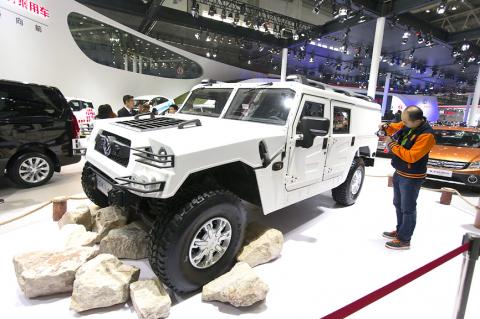Leading automakers gathered in Beijing yesterday for China’s biggest car show, expressing confidence in the world’s largest car market despite the uncertainty created by lackluster growth and environmental restrictions.
More than 1,100 vehicles are being displayed at the Beijing International Automotive Exhibition in the capital’s suburbs, which opens to the public today.
General Motors Co, Toyota Motor Corp, Volkswagen Group and Hyundai Motor Co are among the global manufacturers on the list of attendees, along with SAIC Motor Corp (上海汽車) and Dongfeng Motor Corp (東風), China’s No. 1 and No. 2 domestic automakers respectively.

Photo: EPA
At Ford Motor Co’s display, president and CEO Alan Mulally rode onto the stage in a bright red Ford Mustang model that is the latest incarnation of the iconic brand, which is celebrating its 50th year.
“How cool is that,” he said after getting out, his red tie matching the vehicle’s paint job.
The expo comes as a growing number of Chinese cities are restricting the number of cars on the road in a bid to battle pollution and congestion — moves analysts warn could cut into purchases.
The eastern city of Hangzhou, a popular tourist destination, last month became the sixth major Chinese city to restrict the number of cars on its roads, with some estimates placing the limit at 80,000 license plates a year.
China’s car sales surged 13.9 percent to 21.98 million vehicles last year, but that growth hit a speed bump last month, slowing to a 6.6 percent year-on-year rise after reaching a record 17.8 percent high in January.
The world’s No. 2 economy has also turned in its weakest performance in 18 months, growing 7.4 percent in the first quarter of the year. Beijing has indicated a willingness to accept weaker growth as it tries to move the economy away from investment and toward domestic consumption.
Despite the concerns raised by these developments, industry players and analysts say the Chinese market’s importance to global manufacturers cannot be overstated.
“I think the market for cars is going to continue to be fantastic,” Mulally told reporters, adding that the promise of increased domestic spending outweighed concerns about congestion.
China’s overall plan “to move to a consumer-based economy” was a key factor “that reduces risk,” he said.
Ford has opened three plants in China since 2012, with four more under construction, Mulally said, adding that the move “is part of our biggest global manufacturing expansion in 50 years.”
Karsten Engel, president and chief executive of BMW AG’s operations in China, said that the German automaker was planning to introduce 10 new models to the Asian giant this year, as well as carrying out more manufacturing and research and development in the country.
“All these efforts are based on our confidence in the long-term development of our success here,” he said.

In Italy’s storied gold-making hubs, jewelers are reworking their designs to trim gold content as they race to blunt the effect of record prices and appeal to shoppers watching their budgets. Gold prices hit a record high on Thursday, surging near US$5,600 an ounce, more than double a year ago as geopolitical concerns and jitters over trade pushed investors toward the safe-haven asset. The rally is putting undue pressure on small artisans as they face mounting demands from customers, including international brands, to produce cheaper items, from signature pieces to wedding rings, according to interviews with four independent jewelers in Italy’s main

Japanese Prime Minister Sanae Takaichi has talked up the benefits of a weaker yen in a campaign speech, adopting a tone at odds with her finance ministry, which has refused to rule out any options to counter excessive foreign exchange volatility. Takaichi later softened her stance, saying she did not have a preference for the yen’s direction. “People say the weak yen is bad right now, but for export industries, it’s a major opportunity,” Takaichi said on Saturday at a rally for Liberal Democratic Party candidate Daishiro Yamagiwa in Kanagawa Prefecture ahead of a snap election on Sunday. “Whether it’s selling food or

CONCERNS: Tech companies investing in AI businesses that purchase their products have raised questions among investors that they are artificially propping up demand Nvidia Corp chief executive officer Jensen Huang (黃仁勳) on Saturday said that the company would be participating in OpenAI’s latest funding round, describing it as potentially “the largest investment we’ve ever made.” “We will invest a great deal of money,” Huang told reporters while visiting Taipei. “I believe in OpenAI. The work that they do is incredible. They’re one of the most consequential companies of our time.” Huang did not say exactly how much Nvidia might contribute, but described the investment as “huge.” “Let Sam announce how much he’s going to raise — it’s for him to decide,” Huang said, referring to OpenAI

The global server market is expected to grow 12.8 percent annually this year, with artificial intelligence (AI) servers projected to account for 16.5 percent, driven by continued investment in AI infrastructure by major cloud service providers (CSPs), market researcher TrendForce Corp (集邦科技) said yesterday. Global AI server shipments this year are expected to increase 28 percent year-on-year to more than 2.7 million units, driven by sustained demand from CSPs and government sovereign cloud projects, TrendForce analyst Frank Kung (龔明德) told the Taipei Times. Demand for GPU-based AI servers, including Nvidia Corp’s GB and Vera Rubin rack systems, is expected to remain high,